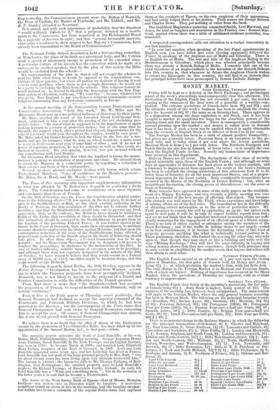The Times of this morning adds important supplementary information to
what was afforded by M. Radowitz's despatch in yesterday's Daily Foes. The Confederation had come to resolutions even more vigorous and conclusive than those of Prussia.
On the 26th of October, says the Times, the Confederation adopted resolu- tions to the following effect—" It was agreed, in the first place, to declare at once to the Stadtholderatc at Kiel, as the chief existing authority in the Duchy of Holstein, the firm resolution of the Diet not to tolerate further hostilities, and that the Stadtholderate should take care to prevent any fresh aggression,. that, on the contrary, the Holstein forces should be withdrawn South of the Eyder, that two-thirds of them should be disbanded, and that this intimation should be conveyed to the Stadtholderate in proper form by the legation of the presiding Federal Power. It was further agreed to in- termite to the Court of Denmark, that, under these circumstances, no military measure should be employed by the Danes against Holstein ; but that upon the contemplated reduction of the army of the Stadtholderate being effected, a proportionate reduction of the Danish army in the South of Schleswig should take place. To effect these objects, a Federal Commission was to be ap- pointed ; and the Hanoverian Government was to designate a fit person to conduct the proceedings, in obedience to the instructions of the Diet. In case of further difficulty, suitable means of execution were to be provided ; and although these were not expressly designated in the minute of the 26th of October, we have reason to believe that they would consist in a Federal army of 31,000 men of which one-third might be Austrian troops, and this corps would occupy Holstein."
The following despatch, dated Berlin, the 30th October, appears in the A-o/ner Zeitun9—" Information has been received from Warsaw, accord- ing to which the Prussian proposals have been peremptorily declined. Denmark, too, is not likely to accede to the proposal of a Danish and German Commission to settle the difficulties of the Danish question."
From Kid there is news that " the Staathalterschaft had accepted the proposition of Prussia to suspend hostilities with Denmark, only on certain conditions."
Four or five of the Paris papers of Thursday assert positively, that General Neumayer had declined to aeoept the superior command of the Fourteenth and Fifteenth Military Divisions, to which he had been wizened in the Moniteur ; but the correspondent of the Times states that General Ohangarnier had sent twice to General Neumayer, entreating him to accept the post. Of course, if General Changarnier was sincere, his desire would prevail with General Neumayer.


























 Previous page
Previous page